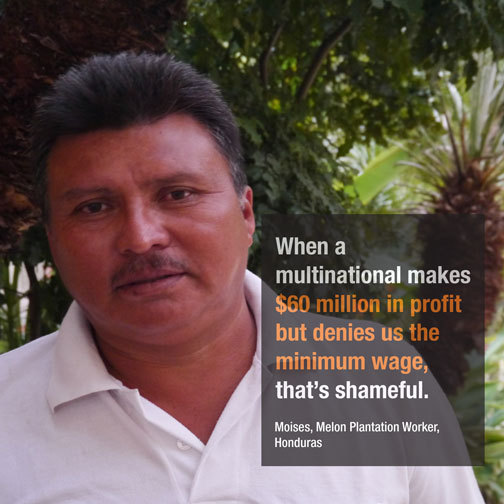A global advertising buy worth millions of dollars has spread across screens from Brazil to Guatemala, Indonesia to South Korea.
Combining the world's anthems into one song for the Rio Olympics, Samsung has unwittingly shown their true corporate colours.
From global athletes, sporting heroes, weekend athletes and schoolchildren, each line of a national anthem weaves seamlessly together to create a song of global unity.
Behind this feel-good advert is a sinister message of the power of companies over governments, the power of corporations over nations.
Fifty of the world's biggest multinationals have a hidden workforce of over a million workers, and 25 companies have a combined wealth of US$1.9 trillion - that could buy a country the size of South Korea or Canada. Corporate power is out of check.
When a woman in Honduras gets up at 2:00 a.m. to travel to work in the melon plantations in Honduras where each day she faces violence and disrespect; where each day she will be harassed and bullied; where she is often forced to work hours of overtime for no additional money despite poverty wages on which she cannot live and without even the dignity of sanitation, something is wrong.
When a banana worker in Guatemala is forced to drag multiple banana stems each weighing up 50 kilos with a rope attached to his back, something is wrong.
And when workers standing up for fundamental labour rights, students calling for democratic rights and freedoms or indigenous people defending their lands from corporate takeover are shot with impunity in these countries, something is very wrong.
Workers know first-hand how corporate capture of government is undermining their rights and freedoms as citizens.
Disproportionate corporate power over governments is giving license to the greed that denies workers even minimum living wages. It is also seemingly a license to allow the sheer brutality of treatment of working people at the base of the supply chains.
When workers in the supply chains of multinational companies in the UK are on zero-hours contracts; in the US have below minimum-wage jobs; in Panama face the daily uncertainty of short-term contracts; and in Indonesia face hazardous working conditions, then the global model of trade is broken.
Panama, the gateway to Central America, is lively with construction from the canal to the city centre, but below the signs of prosperity and more than eight percent growth, the minimum wage is merely US$400 a month for retail workers with a maximum $534 a month in any sector despite a living wage being calculated at more than $1,000.
Informal working arrangements afflict the majority of people, and thus the majority of the population have no social protection. Even workers in the Canal Zone who are not on the ships are struggling to raise their families, and yet ships can pay hundreds of thousands of dollars to pass through and ply their trade.
In Guatemala, workers have lost faith in a government that for many years has promised improved minimum wages and social protection, where indigenous people are still in extreme poverty and where trade union leaders or community activists can simply be shot with impunity. Some employers are even increasingly vocal against municipalities seeking to exempt themselves from even the low minimum wages paid today and the violence and corruption that is crippling a nation.
When minimum wages are at best US$332 a month and many rural workers and women earn less than US$200 while the government's own figures show that a living wage is around US$800, the dignity of families is damaged but so too is economic growth and sustainability.
And in Honduras, where a melon worker travelled many hours to tell me of the exploitation and forced overtime - with tears in his eyes when he described the treatment of women - we all have a responsibility to act.
He asks why a multinational company that earns tens of millions in profits won't even pay the minimum wage. Why indeed does the world watch a broken model of global trade - our supply chains - grow off the misery of people denied rights, minimum living wages, social protection and a rule of law they can trust?
These humble questions and gross symbols of corporate greed are too big to ignore.
The millions of hidden workers for whom companies take no responsibility, using forced labour or paying below the minimum wage, is compounded by the practice of companies changing their names leaving workers with no record of who their employers are and who is responsible for their wages and social protection payments.
Then there are the tax havens where corporate assets keep the wealth of the one percent.
The corporate capture of government is not an illusion when a former Shell executive is in the Minstry of Energy, and a former JP Morgan Director sits in a Finance Ministry in Argentina.
And when Samsung, a multinational that has built its business on a global supply chain of low-wage workers, takes over national anthems with the promise of a world without borders, their sinister wish is for a world without rights.
The answer is to reinstate responsibility - for responsible governments to mandate due diligence that ensures transparency and rights through their supply chains with the rule of law that allows responsible companies to operate with respect for human rights and others to be exposed.
